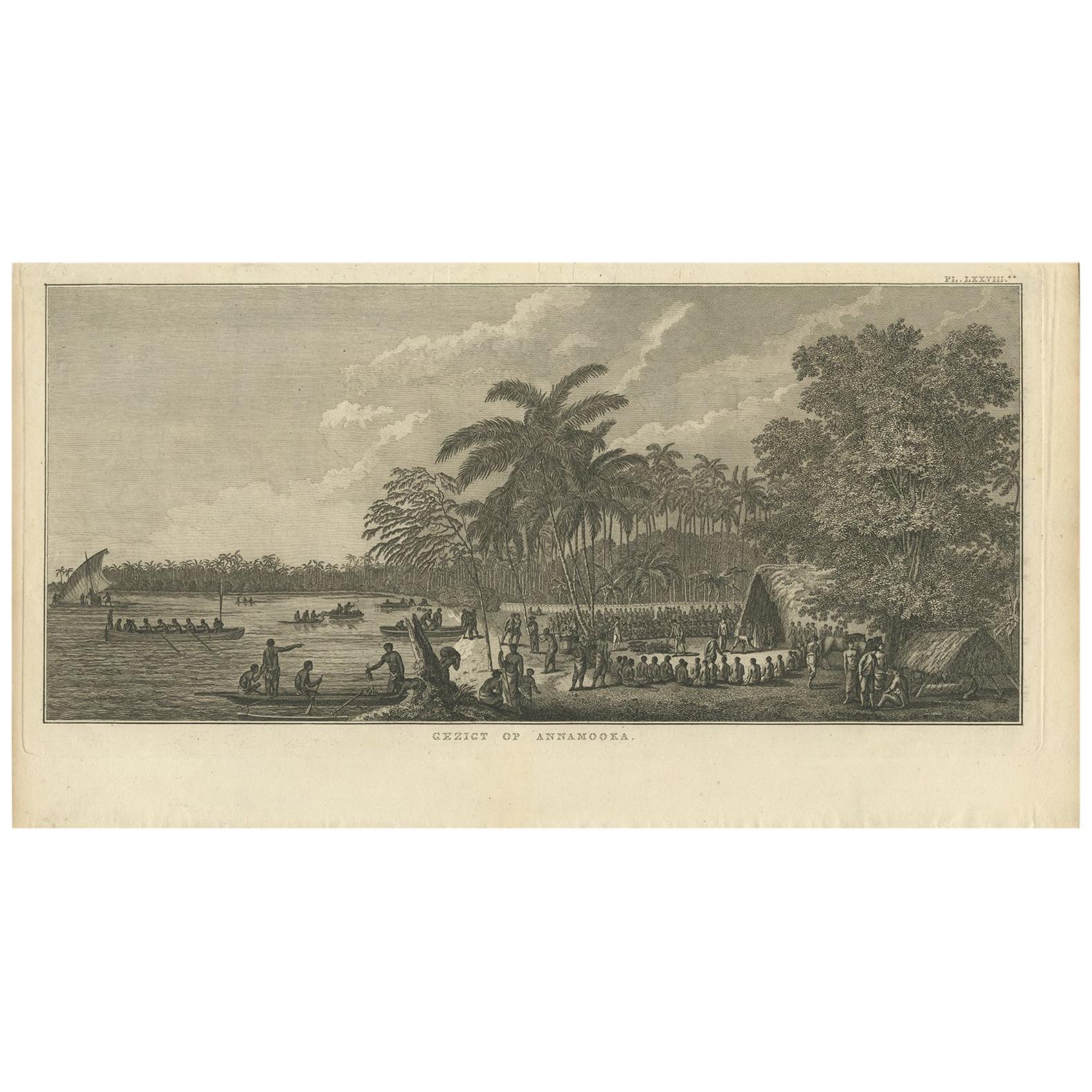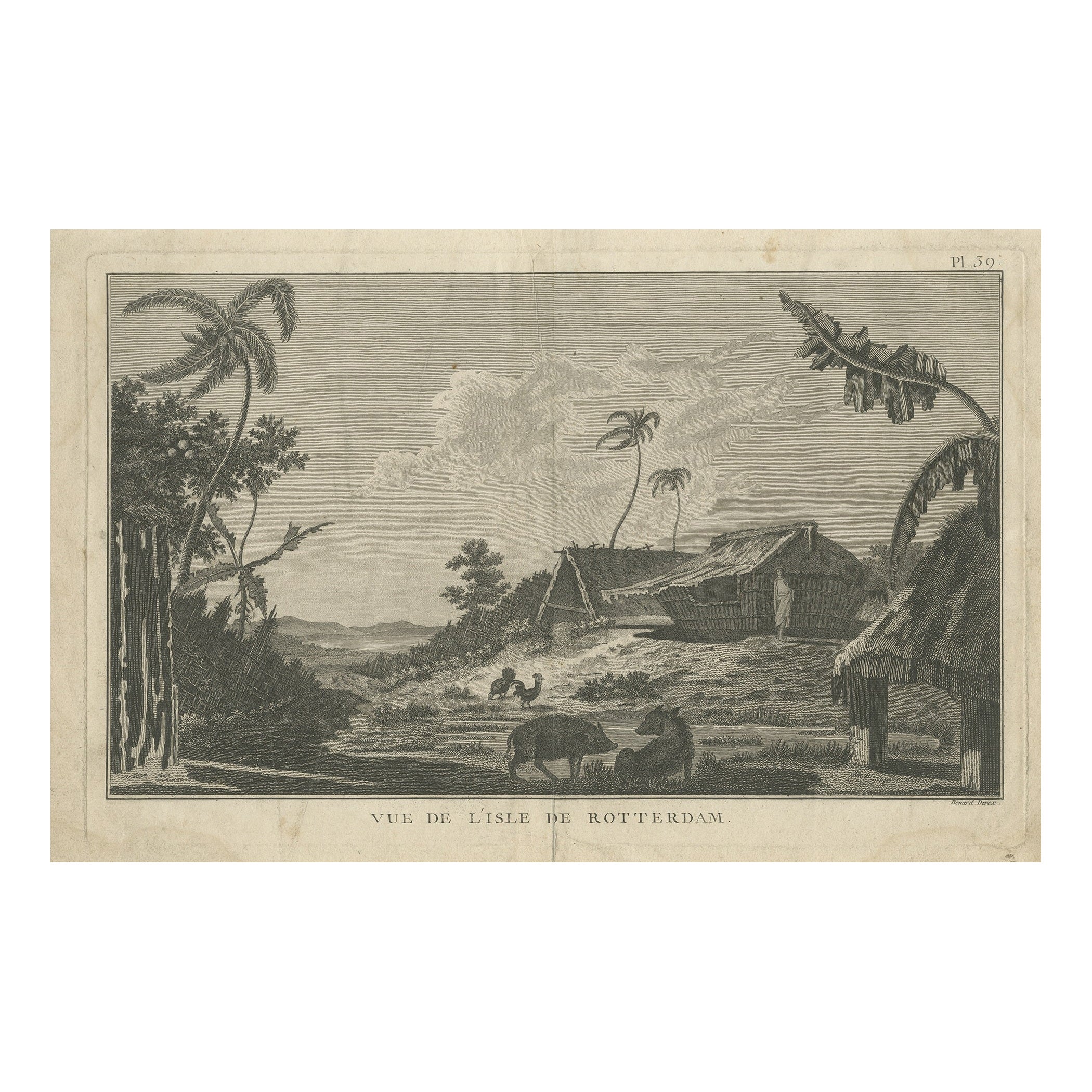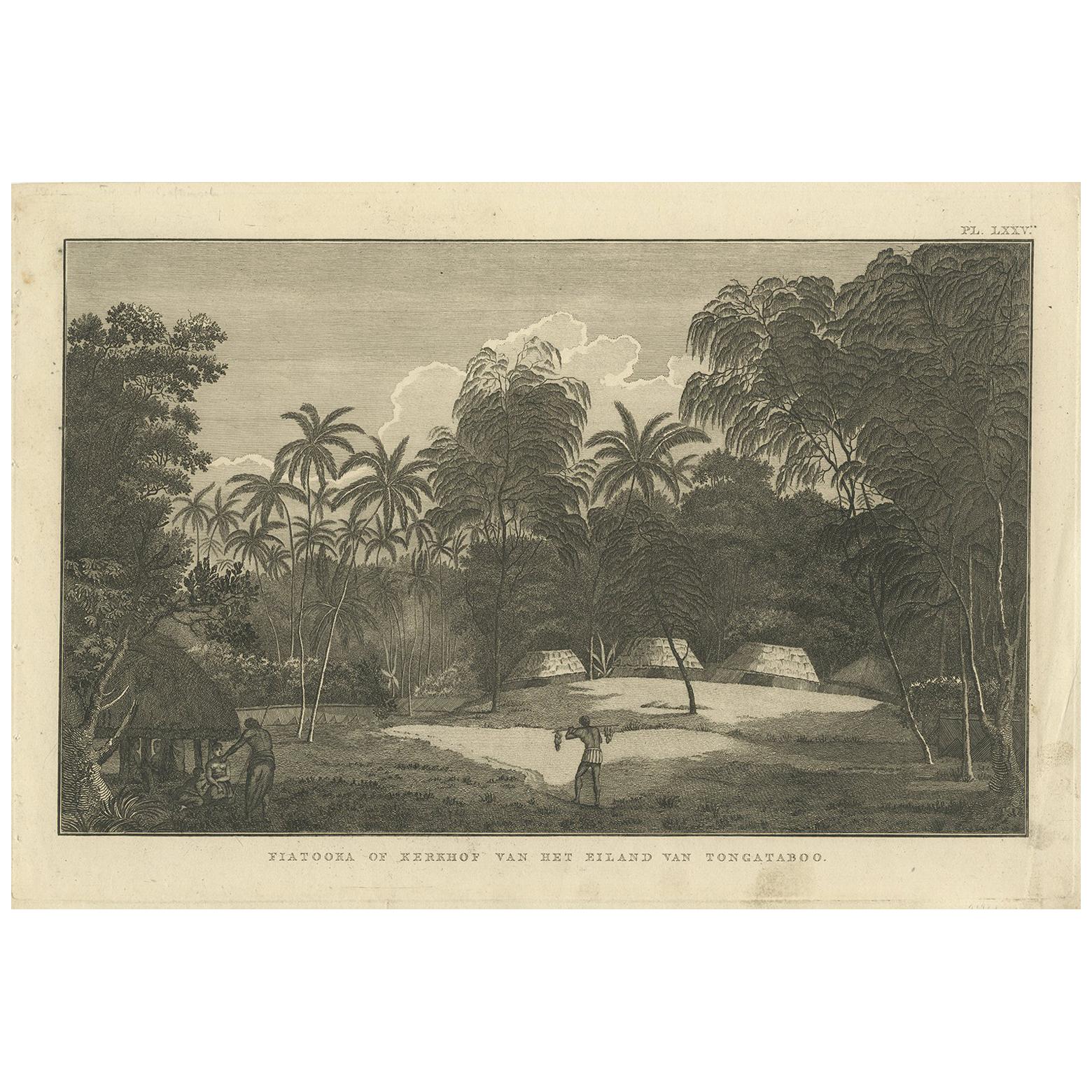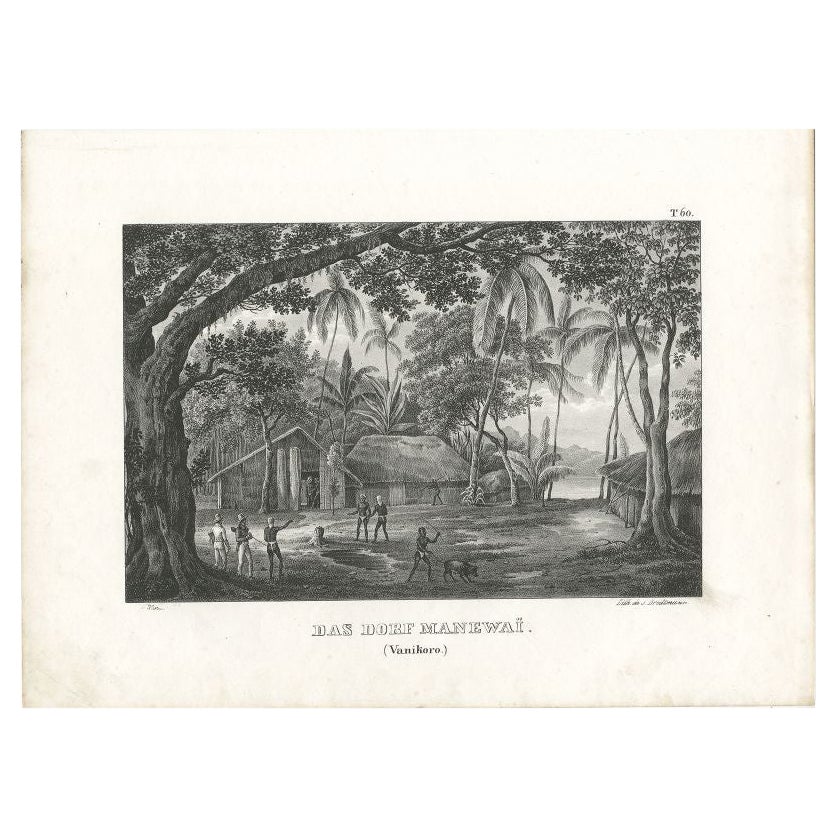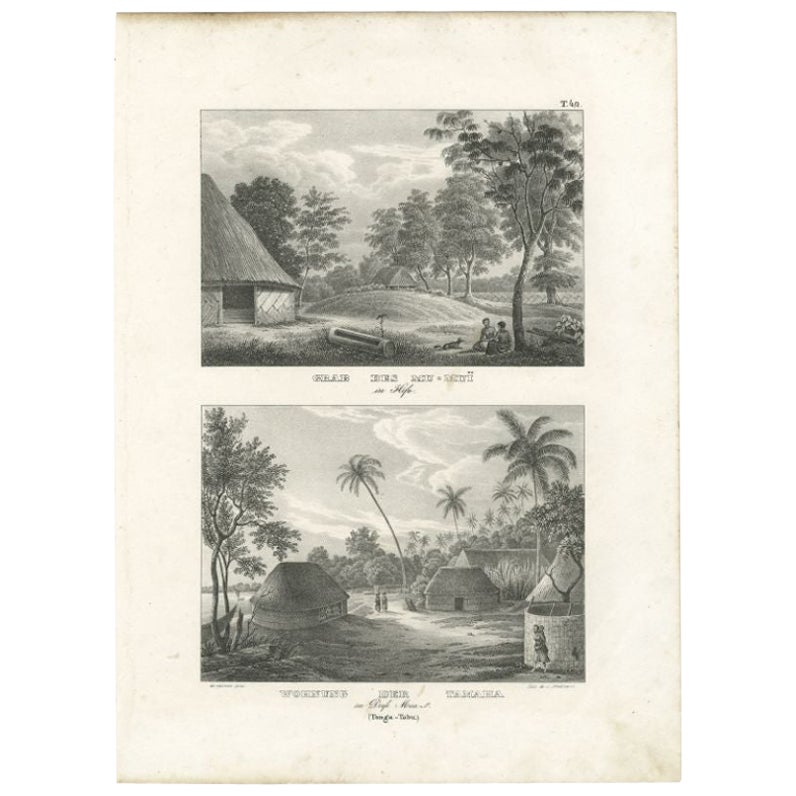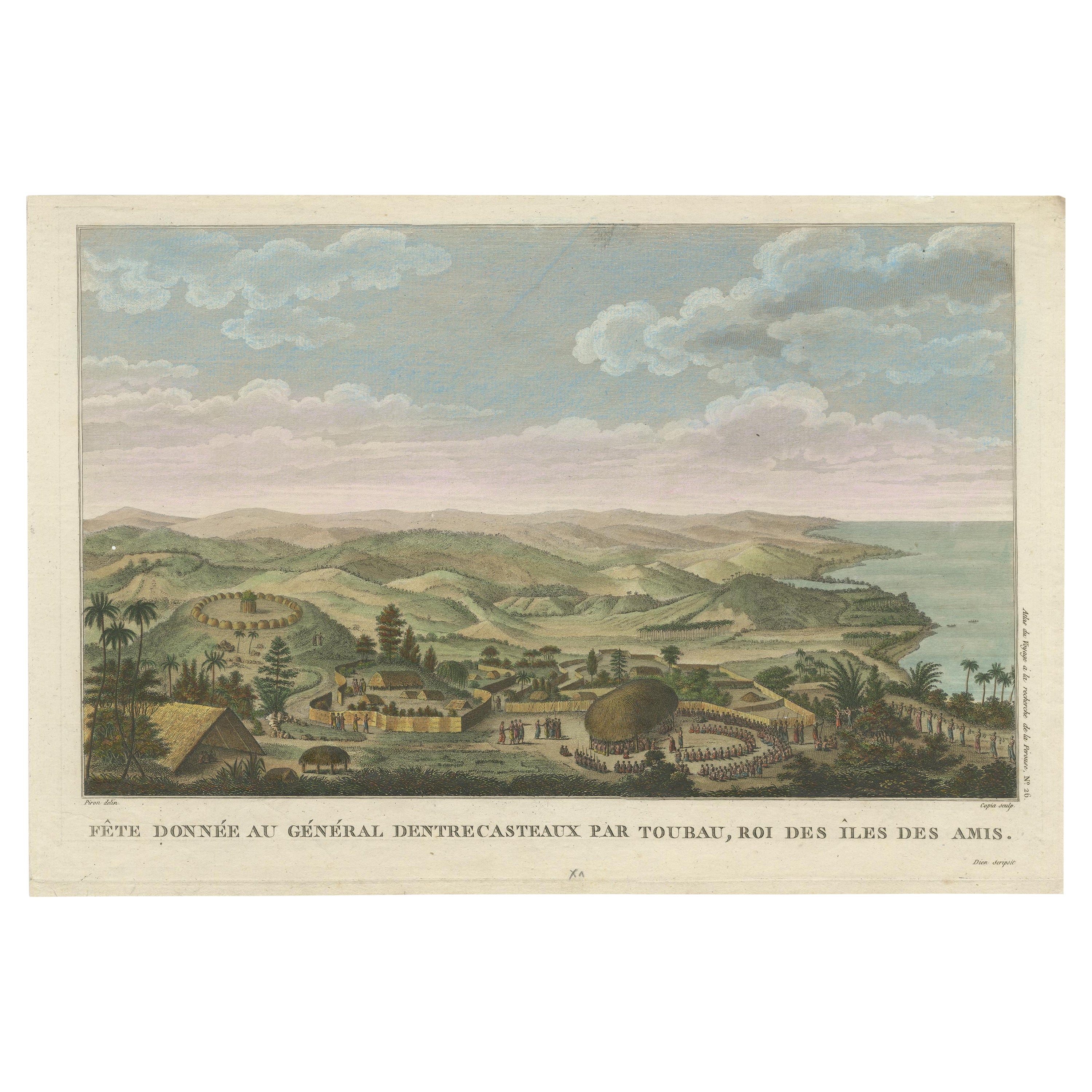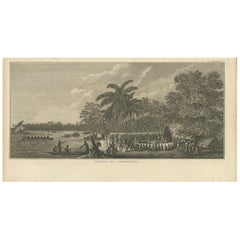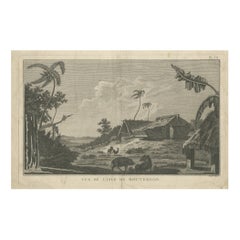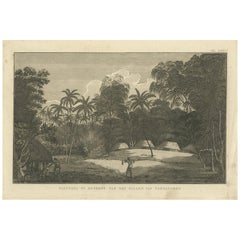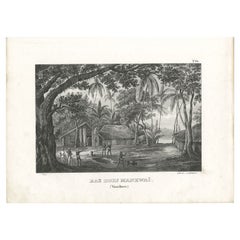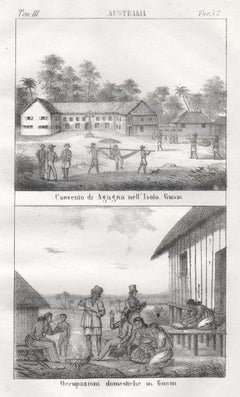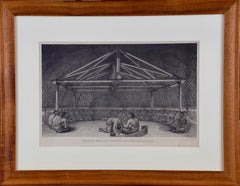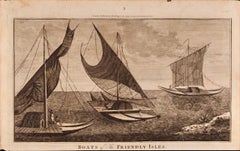Items Similar to Antique Print of the Marketplace in Anamooka, Tonga Islands, c.1790
Want more images or videos?
Request additional images or videos from the seller
1 of 5
Antique Print of the Marketplace in Anamooka, Tonga Islands, c.1790
$228.84
$286.0520% Off
£169.45
£211.8220% Off
€192
€24020% Off
CA$314.69
CA$393.3620% Off
A$350.01
A$437.5220% Off
CHF 183.19
CHF 228.9920% Off
MX$4,269.02
MX$5,336.2720% Off
NOK 2,301.85
NOK 2,877.3120% Off
SEK 2,165.18
SEK 2,706.4820% Off
DKK 1,461.76
DKK 1,827.1920% Off
About the Item
Antique print titled 'View in Anamooka and the Inhabitants'. Depicts the marketplace that was established in a ring in front of the main house in Anamooka, Tonga - named the Friendly Islands because of his reception when James Cook's third Pacific voyage arrived there in May 1777.
Artists and Engravers: Engraved for Bankes's 'New System of Geography'. Published by Royal Authority.
Condition: Good, age-related toning. Please study image carefully.
Date: c.1790
Overall size: 38.6 x 23.2 cm.
Image size: 30.6 x 21.5 cm.
A View at Anamooka
This engraving after a drawing comes from the official account of Cook's third voyage, 'A voyage to the Pacific Ocean'.
Captain James Cook (1728-1779) made three separate voyages to the Pacific (with the ships Endeavour, Resolution, Adventure, and Discovery) and did more than any other voyager to explore the Pacific and Southern Ocean. Cook not only encountered Pacific cultures for the first time, but also assembled the first large-scale collections of Pacific objects to be brought back to Europe. He was killed in Hawaii in 1779.
Cook was in Nomuka (Annamooka), Tonga or Friendly Isles from May 1-14, 1777.
"On May 2 1777 the expedition reached Nomuka and anchored in the harbour on the north side of the island, which Cook had already used in June 1774. Both ships were in want of refreshments. A camp was erected on shore both as a trading post and a workshop for repairs. Watering, cutting wood, and above all bartering for food became the main occupation during the next days."
In this drawing, the building of relationships and trafficking with the Nomukans are embraced within a broad panorama of documented history. The ships are in this case too far out at sea to be included in the picture though -- as before -- their presence is hinted at by the ships' boats in the harbour. Some are loaded with water barrels, others are being used for transport of food, which is piled up on shore. In the left foreground a native outrigger is being pulled on to the shore, surrounded by Tongans who lift or carry away fruit. They are moving towards the righ, where, between a large hut and a group of coconut palms a large clearning has been made for a group of Nomukans, sitting cross-legged in a circle. In the middle of this hogs, yams, plantains etc. are collected and the marines within the circle are probably engaged in transporting goods received. The presence of the marines is underlined by a pyramid of rifles. They were stationed there 'for the protection of the horses and the waterers'. Two horses may be seen to the right of the hut resting under the shade of a large breadfruit tree. A few yards in front of the tree stands an indigenous hut with open sides and a thatched roof, built on poles. Several Nomukans sit within.
Many studies were necessary to build up a comprehensive scene like this.
Whilst cartography holds a special place in our collection, we also offer thousands of antique prints covering fields of interest as diverse as architecture, natural history, religion, ethnology and many more. Antique prints have long been appreciated for both their aesthetic and investment value. They were the product of engraved, etched or lithographed plates. These plates were handmade out of wood or metal, which required an incredible level of skill, patience and craftsmanship. Whether you have a house with Victorian furniture or more contemporary decor an old engraving can enhance your living space. We offer a wide range of authentic antique prints for any budget.
- Dimensions:Height: 9.14 in (23.2 cm)Width: 15.2 in (38.6 cm)Depth: 0 in (0.01 mm)
- Materials and Techniques:
- Period:
- Date of Manufacture:circa 1790
- Condition:Condition: Good, age-related toning. Please study image carefully.
- Seller Location:Langweer, NL
- Reference Number:Seller: BG-100881stDibs: LU3054327892722
About the Seller
5.0
Recognized Seller
These prestigious sellers are industry leaders and represent the highest echelon for item quality and design.
Platinum Seller
Premium sellers with a 4.7+ rating and 24-hour response times
Established in 2009
1stDibs seller since 2017
2,594 sales on 1stDibs
Typical response time: <1 hour
- ShippingRetrieving quote...Shipping from: Langweer, Netherlands
- Return Policy
Authenticity Guarantee
In the unlikely event there’s an issue with an item’s authenticity, contact us within 1 year for a full refund. DetailsMoney-Back Guarantee
If your item is not as described, is damaged in transit, or does not arrive, contact us within 7 days for a full refund. Details24-Hour Cancellation
You have a 24-hour grace period in which to reconsider your purchase, with no questions asked.Vetted Professional Sellers
Our world-class sellers must adhere to strict standards for service and quality, maintaining the integrity of our listings.Price-Match Guarantee
If you find that a seller listed the same item for a lower price elsewhere, we’ll match it.Trusted Global Delivery
Our best-in-class carrier network provides specialized shipping options worldwide, including custom delivery.More From This Seller
View AllAntique Print of Annamooka, Tonga Islands, by Cook '1803'
Located in Langweer, NL
Antique print titled 'Gezigt op Annamooka'. This print depicts the Harbour of Annamooka, now Nomuka, part of the Ha’apai group of Tonga. Originates from 'Reizen rondom de Waereld' by...
Category
Antique Early 19th Century Dutch Prints
Materials
Paper
$357 Sale Price
20% Off
Antique Print of Rotterdam Island, Nomuka, Tonga
Located in Langweer, NL
Antique print titled 'Vue de l'Isle de Rotterdam'. Antique engraving of Rotterdam Island (Nomuka Island) in the Ha?apai group of islands in the Kingdom of Tonga as seen by Captain Co...
Category
Antique Late 18th Century Prints
Materials
Paper
$247 Sale Price
20% Off
Antique Print of the Cemetery on the Island Tongatapu by Cook, circa 1801
Located in Langweer, NL
Antique print titled 'Fiatooka of Kerkhof van het Eiland van Tongataboo'. This print depicts a cemetery on the Island of Tongatapu. Originates from 'Reizen rondom de Waereld' by J. C...
Category
Antique Early 19th Century Prints
Materials
Paper
$114 Sale Price
20% Off
Antique Print of a Village in Vanikoro in the Solomon Islands, c.1836
Located in Langweer, NL
Antique print titled 'Das Dorf Manewaï'. Old print with a view of a village in Vanikoro in the Solomon Islands. This print originates from 'Entdeckungs, Reise der Franzosischen Corve...
Category
Antique 19th Century Prints
Materials
Paper
$181 Sale Price
20% Off
Antique Print of the Tomb of Mu-Muï in Tonga, c.1836
Located in Langweer, NL
Antique print titled 'Grab des Mu-Muï' and 'Wohnung der Tamaha im Dorfe Mua'. Old print with two views, the upper image depicts the tomb of Mu-Muï. The lower image depicts a residenc...
Category
Antique 19th Century Prints
Materials
Paper
Beautiful and Rare Original Antique Engraving of a Village in Tonga, 1817
Located in Langweer, NL
Fete donnee au General Dentrecasteaux par Toubau, Roi des Iles des Amis
Original antique engraving showing the party given to General Dentrecasteaux by Toubau, King of the Friendl...
Category
Antique 1810s Prints
Materials
Paper
$610 Sale Price
20% Off
You May Also Like
Guam, Convent and native inhabitants, mid 19th century lithograph. Oceania.
Located in Melbourne, Victoria
'Convento di agagna nell' Isola Guam. Occupazioni domestiche in Guam.'
Italian lithograph, c1841. Originally from 'Galleria universale di tutti i popoli del mondo' by Giuseppe Anton...
Category
Mid-19th Century Naturalistic Figurative Prints
Materials
Lithograph
"King of the Friendly Islands" (Tonga); Engraving from Captain Cook's 3rd Voyage
By John Webber
Located in Alamo, CA
"Poulaho, King of the Friendly Islands, Drinking Kava" is an engraving created by William Sharp (1749-1824), from a drawing by John Webber (1752-1793), who was the artist on Captain James Cook's 3rd and final voyage of discovery. It was published in the atlas of "A Voyage to the Pacific Ocean Undertaken by the Command of His Majesty, for Making Discoveries in the Northern Hemisphere", the official British Admirality sanctioned journal published upon completion of the voyage in London in 1784 by Strahan & Cadell.
Captain Cook visited Tonga on his 3rd voyage, which he named The Friendly Islands because of the warm welcome he and his crew received, unlike some of the other more hostile Pacific islands. The engraving depicts Cook and his men observed a kava ceremony at the village of Mu’a on Tongatapu. King Paulaho sits in the centre foreground, his back to the spectator with a man kneeling before him. The ceremonial mat depicted behind Paulaho indicates that nobody was allowed to sit behind him. The figure in the centre holds a single cup, referring to the Tongan custom of offering the cup to the king first. Kava is native to the islands of the South Pacific and was first described for English readers in 1768 by Captain James Cook. The kava root has been used for centuries as a central feature of ceremonies and celebrations because it was able to bring about a calming and pleasant social atmosphere. The root was crushed and processed into coconut milk to become the focal ceremonial beverage, simply referred to as kava.
This engraving is presented in a Koa wood frame and a white mat. Koa wood is legendary in Hawaii. There are occasional faint spots, but the print is otherwise in very good condition. This amazing Koa wood is native to Hawaii and it is known for the deep rich colors and varied grain pattern. Koa has an honored heritage in Hawaii and is highly revered and sacred. The word “koa” means “warrior” in Hawaiian. The warriors of King Kamehameha the Great, created canoes and weapons from a wood plentiful on the Big Island of Hawaii. This wood became synonymous with the warriors themselves, and it became known as koa.
There are three other engravings listed from the official journal of Captain Cook's 3rd voyage available that are presented in identical Koa wood frames and mats (LU117324682422, LU117324684052, LU117324684032). They would make a wonderful grouping for a display of 2, 3 or 4 prints. A discount is available for a grouping depending on the number of items included.
Captain Cook is remembered as one of the greatest explorers and navigators in history. His explorations included Australia, New Zealand and islands of the South Pacific and the northwest coast of North America. Hawaii was discovered by Captain Cook during this voyage. Hawaii was originally called The Sandwich Islands in honor of The Earl of Sandwich...
Category
1780s Realist Figurative Prints
Materials
Engraving
Reception for Captain Cook, Tonga: Original 18th C. Engraving, Cook's 3rd Voyage
By John Webber
Located in Alamo, CA
"The Reception of Capt. Cook in Hapaee" is an original 18th century engraving from a drawing by John Webber (1751-1793), who was the artist who accompanied Captain Cook on his third ...
Category
1780s Landscape Prints
Materials
Engraving
Boats of the Friendly Isles, Tonga: Original 18th C. Engraving from Captain Cook
By William Hodges
Located in Alamo, CA
"Boats of the Friendly Isles" is an original 18th century engraving from a drawing by William Hodges (1744-1797), who was the artist who accompanies Captain Cook on his second voyage...
Category
1780s Landscape Prints
Materials
Engraving
Surrender of Tahiti to Captain Wallis: An Original 18th C. Engraving
By John Webber
Located in Alamo, CA
"A Representation of the Surrender of the Island of Otaheite to Capt.n Wallis, by the Supposed Queen of Oberea" is an original 18th century engraving created by Sparrow, from a drawi...
Category
1780s Landscape Prints
Materials
Engraving
A View of Kauai, Hawaii Discovered by Captain Cook: Original 18th C. Engraving
By John Webber
Located in Alamo, CA
"View of A Morai or Burial Place of Atooi, One of the Sandwich Islands (Kauai, Hawaii)" is an original 18th century engraving from a drawing by John Webber (1751-1793), who was the a...
Category
1780s Landscape Prints
Materials
Engraving
More Ways To Browse
Antique Anchor Ring
Antique Station Of The Cross
Small Biedermeier Chests
Snuff Spoon
Spanish Headboard
Standing Buddha Bronze
Stephens Antiques
Sterling Engraved Cigarette Case
Storage Headboard King
Tall Narrow Chest
Teak Record
Temple Pillars
Thai Artifact
Tibetan Gilt Bronze
Tropical Bed
Used Furniture Nova Scotia
Vintage Arthur Court Designs
Vintage Hand Carved Wooden Birds
